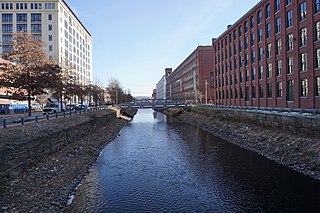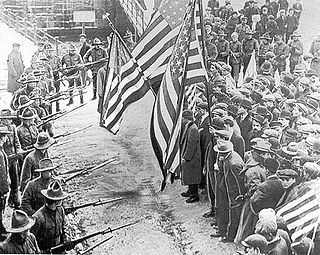
Lawrence is a city located in Essex County, Massachusetts, United States, on the Merrimack River. At the 2020 census, the city had a population of 89,143. Surrounding communities include Methuen to the north, Andover to the southwest, and North Andover to the east. Lawrence and Salem were the county seats of Essex County, until the state abolished county government in 1999. Lawrence is part of the Merrimack Valley.

Samuel Slater was an early English-American industrialist known as the "Father of the American Industrial Revolution", a phrase coined by Andrew Jackson, and the "Father of the American Factory System". In the United Kingdom, he was called "Slater the Traitor" and "Sam the Slate" because he brought British textile technology to the United States, modifying it for American use. He memorized the textile factory machinery designs as an apprentice to a pioneer in the British industry before migrating to the U.S. at the age of 21.
The United States textile workers' strike of 1934, colloquially known later as The Uprising of '34 was the largest textile strike in the labor history of the United States, involving 400,000 textile workers from New England, the Mid-Atlantic states and the U.S. Southern states, lasting twenty-two days.

"Bread and Roses" is a political slogan as well as the name of an associated poem and song. It originated in a speech given by American women's suffrage activist Helen Todd; a line in that speech about "bread for all, and roses too" inspired the title of the poem Bread and Roses by James Oppenheim. The poem was first published in The American Magazine in December 1911, with the attribution line "'Bread for all, and Roses, too'—a slogan of the women in the West." The poem has been translated into other languages and has been set to music by at least three composers.

The Lawrence Textile Strike, also known as the Bread and Roses Strike, was a strike of immigrant workers in Lawrence, Massachusetts, in 1912 led by the Industrial Workers of the World (IWW). Prompted by a two-hour pay cut corresponding to a new law shortening the workweek for women, the strike spread rapidly through the town, growing to more than twenty thousand workers and involving nearly every mill in Lawrence. On January 1, 1912, the Massachusetts government enforced a law that cut mill workers' hours in a single work week from 56 hours, to 54 hours. Ten days later, they found out that pay had been reduced along with the cut in hours.

Joseph James "Smiling Joe" Ettor (1885–1948) was an Italian-American trade union organizer who, in the middle-1910s, was one of the leading public faces of the Industrial Workers of the World. Ettor is best remembered as a defendant in a controversial trial related to a killing in the seminal Lawrence Textile Strike of 1912, in which he was acquitted of charges of having been an accessory.

The 1913 Paterson silk strike was a work stoppage involving silk mill workers in Paterson, New Jersey. The strike involved demands for establishment of an eight-hour day and improved working conditions. The strike began in February 1913, and ended five months later, on July 28. During the course of the strike, approximately 1,850 strikers were arrested, including Industrial Workers of the World (IWW) leaders Bill Haywood and Elizabeth Gurley Flynn.

The Amoskeag Manufacturing Company was a textile manufacturer which founded Manchester, New Hampshire, United States. From modest beginnings it grew throughout the 19th century into the largest cotton textile plant in the world. At its peak, Amoskeag had 17,000 employees and around 30 buildings.

The Lowell mill girls were young female workers who came to work in textile mills in Lowell, Massachusetts during the Industrial Revolution in the United States. The workers initially recruited by the corporations were daughters of New England farmers, typically between the ages of 15 and 35. By 1840, at the height of the Textile Revolution, the Lowell textile mills had recruited over 8,000 workers, with women making up nearly three-quarters of the mill workforce.
The American Woolen Company is a designer, manufacturer and distributor of men’s and women’s worsted and woolen fabrics. Based in Stafford Springs, Connecticut, the company operates from the 160-year-old Warren Mills, which it acquired from Loro Piana SpA in June 2014.

Anna LoPizzo was an Italian immigrant striker killed during the Lawrence Textile Strike, considered one of the most significant struggles in U.S. labor history.

The North Canal Historic District of Lawrence, Massachusetts, encompasses the historic industrial heart of the city. It is centered on the North Canal and the Great Stone Dam, which provided the waterpower for its many mill complexes. The canal was listed on the National Register of Historic Places in 1975, while the district was first listed in 1984, and then expanded slightly in 2009.

The Merrimack Valley is a bi-state region along the Merrimack River in the U.S. states of New Hampshire and Massachusetts. The Merrimack is one of the larger waterways in New England and has helped to define the livelihood and culture of those living along it for millennia.

The 1926 Passaic textile strike was a work stoppage by over 15,000 woolen mill workers in and around Passaic, New Jersey, over wage issues in several factories in the vicinity. Conducted in its initial phase by a "United Front Committee" organized by the Trade Union Educational League of the Workers (Communist) Party, the strike began on January 25, 1926, and officially ended only on March 1, 1927, when the final mill being picketed signed a contract with the striking workers. It was the first Communist-led work stoppage in the United States. The event was memorialized by a seven reel silent movie intended to generate sympathy and funds for the striking workers.
The Bread and Roses Heritage Festival is an annual, open-air festival in Lawrence, Massachusetts that celebrates labor history, cultural diversity, and social justice. It is a free, day-long event featuring live music and dance, children’s activities, theater and spoken word performances, walking and trolley tours, ethnic food, Lawrence History Live! and information from local organizations involved in social justice issues. The Bread And Roses Heritage Committee produces the event. The festival has occurred every year on Labor Day since its inception in 1986. Bread and Roses is the only broadly multicultural festival in Lawrence, the Immigrant City. The festival's name refers to the "Bread and Roses strike" of 1912, when over 20,000 immigrant workers in Lawrence, Massachusetts protested wage cuts for over two months, led by the Industrial Workers of the World. The strike was notable for its short-term success, despite ethnic divisions among the workers and the preponderance of women among the protesters.

Carmela Teoli was an Italian-American mill worker whose testimony before the U.S. Congress in 1912 called national attention to unsafe working conditions in the mills and helped bring a successful end to the "Bread and Roses" strike. Teoli had been scalped by a cotton-twisting machine at the age of 13, requiring several months of hospitalization.

The 1928 New Bedford textile strike was a mass work stoppage of approximately 30,000 machinery operatives in several of the large cotton mills located in New Bedford, Massachusetts, USA. The strike, which ran for several months during the spring and summer of 1928, is remembered for the prominent role played by the Workers (Communist) Party of America in mobilizing the immigrant workers of the region.

The 1907 Skowhegan textile strike was a labor dispute between approximately 225 mill workers and the owners of the Marston Worsted Mill in Skowhegan, Maine, United States. Declared following the firing of 17 year-old French Canadian-American girl named Mamie Bilodeau, the strike was the first successful strike involving the recently formed Industrial Workers of the World.
The 1914–1915 Fulton Bag and Cotton Mills strike was a labor strike involving several hundred textile workers from the Fulton Bag and Cotton Mills in Atlanta, Georgia, United States. The strike, which involved about 500 millworkers, began on May 20, 1914, and ended almost a year later on May 15, 1915, in failure for the strikers.

The New England Textile Strike was a strike led by members of the United Textile Workers of America (UTW) principally in the U.S. states of Massachusetts, New Hampshire, and Rhode Island. Throughout the duration of the strike, an estimated 68,000-85,000 workers refused to work. Alongside the UTW, the IWW and ATW played major organizing roles within it, with the strike lasting for around 200 days at most mills.
















